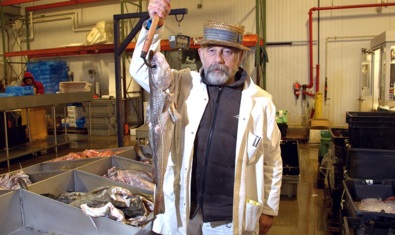Markets: Selling, Buying, Profit& Loss, Values, Family, Friends, Cash, Credit, What to do? Where to go? What to say? Who to trust?...
Can the Bastard of Billingsgate teach a thing or two to our MBA students?

Roger Barton, the Bastard of Billingsgate
Photo: broadcastnow.co.uk
Charismatic market trader, Roger Barton, has worked in London's Billingsgate Fish Market for 50 years. Tough-talking and ruthless, he revels in the nickname the Bastard of Billingsgate. After just five weeks off in five decades, he takes the trip of a lifetime, visiting the world's greatest food markets
From The London Markets, we had learned that markets could tell us about the city and its people too. “From the fattest fat cat to the poorest slum dog, markets are a mainline for commerce and culture at every level of society.”
Travelling has made Barton come over all philosophical, “I’ve got the taste for seeing other people and the way they trade,” says Barton, “It made me think about what I’ve done in life, and made me wonder if I’ve been on the right trail? "The pound sign is not the be all and end all."
“In Billingsgate it’s nice to know you can make a few quid (£), and it’s nice to know that, at times, you’re the top man. In the places we visited for the show it didn’t seem to matter. It’s nice to be important, but it’s important to be nice.”
Hands-on learning
At our universities - by and large - students are disciplined to concentrate on one school of thought, focus on a case and stick to their limited academic territory and theories, which may look OK in the class rooms, but, totally irrelevant in the real world.
This is why I firmly believe that the ‘Learning through Practice’ or hands-on learning approach should be embedded in the MBA’s core values. MBA students, if we really wish to give them the best education, should be taught to understand the limitations of theories and tackle the wicked problems and uncertainty of the actual business world. Hands-on learning helps to ask questions such as: What is behind the theories and frameworks one can detect? What are the business’ motivations? Should they change and if so why and how? How markets act and react? These are the type of questions students should be encouraged to ask. Putting theories into practice is not to adjust one for another. Practical approaches to problems may be found by seeing through the lenses of various theories and frameworks, individuals and groups.
And Now Our MBA Marketing Module: A Three-Hour Module on How Markets Function in the Real World!

Billingsgate fish market in London, New York's New Fulton market, Mexico City's Central de Abasto, the largest food market on the planet, and Delhi's Azadpur Mandi, a market so big it provides food for the whole of India.
Following a dream of visiting - and trading in - the world's greatest food markets, Billingsgate trader Roger Barton heads across the Atlantic to New York's New Fulton market, the biggest and roughest fish market in America. Can he compete with its ruthless traders and the worst winter storms in decades to make a profit?
Hour One: Introduction to the series and the Episide 1:New Yourk
BBC Worlds Greatest Food Markets 1of3 New York 720p HDTV x264 AAC MVGroup org - YouTube
Hour Two: Mexico City
Roger travels to Mexico City's Central de Abasto as he pits himself against some of the world's sharpest traders. The food market is the largest of its kind in the world.
BBC Worlds Greatest Food Markets 2of3 Mexico 720p HDTV x264 AAC MVGroup org - YouTube
Hour Three: Delhi and Conclusions
On this trip the Bastard of Billingsgate is off to Delhi
INDIA -World's Greatest Food Markets // Full Documentary 2014 - YouTube
